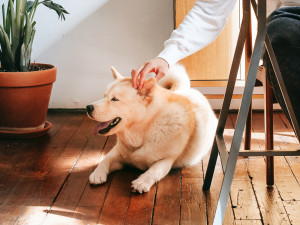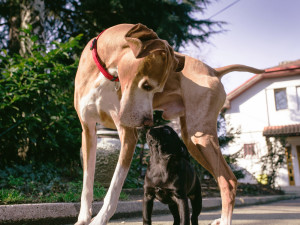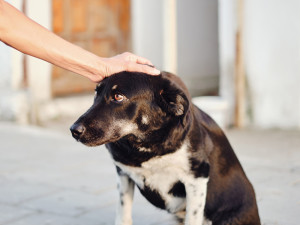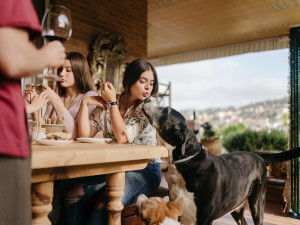Is “Muzzle Grabbing” a Proper Canine Greeting?
Behaviorist Karen London talks about why snout shaking is an awkward way to say hello to a dog.
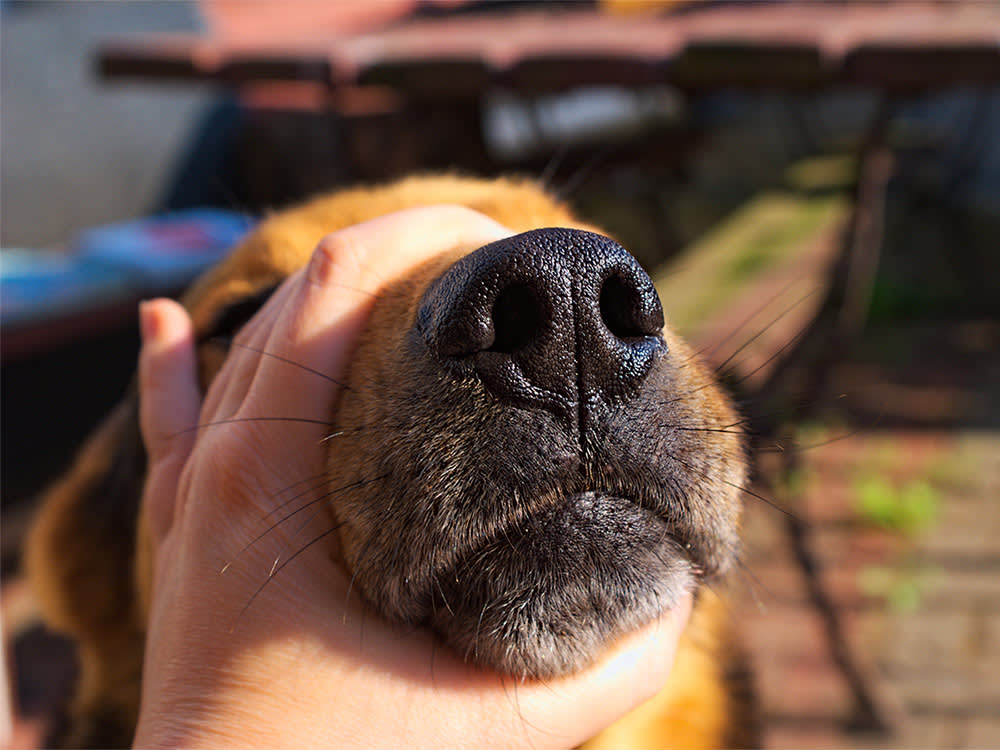
share article

Your pet wants you to read our newsletter. (Then give them a treat.)
How do you greet your dog? A scratch on the back or under the chin? What about grabbing and “shaking” a dog’s open mouth? Is that normal or downright bizarre? When the video of presidential candidate Michael Bloomberg greeting a dog was first brought to my attention, I was surprised by how many people defended it as a demonstration of a perfectly normal way to greet a dog. Let me settle this debate: muzzle grabbing is not a kind way to interact with a dog and is not appropriate.
There are differences between play and greetings
It’s true that many dogs do playfully use their mouths to interactopens in a new tab with one another, and you do sometimes see dogs mouthing at each other and engaged in a sort of muzzle sparring. The thing is, though, dogs don’t act this way when they are greeting, especially if they are strangers to one another. Using their mouths to interact is unusual unless they know each other well, and even then, it typically occurs during play, not during greetingsopens in a new tab.
Play behavioropens in a new tab in dogs includes many types of interactions that would be considered inappropriate and could even be risky in any other context. For example, when playing, dogs will often growl, mouth at each other, pounce on one another, and bat at each other with their paws. All of these behaviors can be perfectly appropriate in play, but not one of them is a normal part of a greeting between dogs, especially if the greeting is with a dog they don’t know.
Here’s a simple analogy: It’s common for parents playing with their children to say, “I’m going to get you!” Between parent and child, it’s appropriate and it’s understood that the phrase is all in good fun. But, for an adult to say, “I’m going to get you!” to a child they are greeting for the first time would be inappropriate, strange, and unlikely to be well received. Shaking the muzzle of an unknown dog with your hand is not only bizarre and socially unacceptable but possibly dangerous.
Avoid snout grabbing, greet dogs the right way.
Many dogs will likely find muzzle grabbing objectionable, and a few of those are likely to react poorly by bitingopens in a new tab. But why risk it? A dog who seems to be stable and agreeable might show subtle signs of stressopens in a new tab, like tongue flicks, yawning, and furrowing of the brow. Even though a dog might not react by biting, they still likely find it unpleasant, uncomfortable, or awkward.
If you’re looking to make a good impression with people and their pups, steer clear of muzzle shaking, grabbing, and head pattingopens in a new tab. If you want to greet a dog, ask permission first and find out how their pet likes to be greeted. You’re far better off offering a dog a treat (with their person’s permission) or simply saying hello to them. For those looking for the short answer, it’s simple: don’t put your hand in a dog’s mouth and then shake them by the muzzle.

Karen B. London, PhD, CAAB, CPDT-KA
Karen B. London, Ph.D., is a Certified Applied Animal Behaviorist and Certified Professional Dog Trainer who specializes in working with dogs with serious behavioral issues, including aggression, and has also trained other animals including cats, birds, snakes, and insects. She writes the animal column for the Arizona Daily Sun and is an Adjunct Professor in the Department of Biological Sciences at Northern Arizona University. She is the author of six books about training and behavior, including her most recent, Treat Everyone Like a Dog: How a Dog Trainer’s World View Can Improve Your Lifeopens in a new tab.
Related articles
![Big dog sniffs little dog in greeting]() opens in a new tab
opens in a new tabHow to Properly Introduce Two Pups
There’s a lot more to it than sniffing each other’s butts.
![Dog that looks unhappy being patted on the head by someone's hand while sitting on pavement outside]() opens in a new tab
opens in a new tabUh, Why Doesn’t My Dog Like Getting Pet?
“No touch-y!”
![A dog looking up with a cute face]() opens in a new tab
opens in a new tabHow to Get Your Scared Dog to Trust You
Using these tips, your skittish dog will warm up to you.
![Big dog says hello to a dinner guest sitting at the table]() opens in a new tab
opens in a new tabHow Can I Stop My Dog From Getting Overly Excited When Holiday Guests Arrive?
Expert advice for people with dogs who jump, bark, and generally go nuts when people come over.
